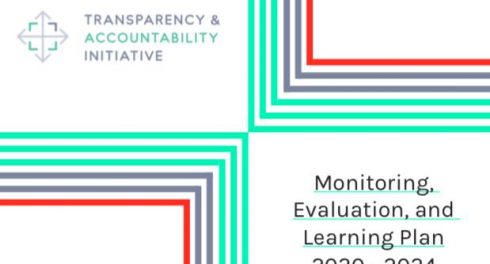TAI spotlight
- Externalities and our work in Nigeria | MacArthur Foundation
TAI points of contact Kole Shettima and Erin Sines of MacArthur Foundation reflect on the challenges of a sectoral approach to tackling petty corruption in Nigeria
- DFID Research Blogs | DFID
DFID launches new blog series to share information and initiatives by its Research and Evidence Division
- You Will Discover It’s Easy to Become a Philanthropist | Ford Foundation
For Forbes’ 10 Predictions on the Next 10 Years, Ford Foundation President Darren Walker, talks about the future of philanthropy. His prediction? More people, of every income level, will direct resources toward social good. Walker’s interview on trends in philanthropic giving is also available.
- Help Us Design Research on How Digital Platforms Can Help Governments Respond to Citizen Feedback | William + Flora Hewlett Foundation
Hewlett Foundation seeks proposals for a collaborative research on harnessing citizen feedback for better public service delivery
- Empowering People to Tell Their Own Stories |MacArthur Foundation
MacArthur Foundation expands its Journalism and Media portfolio to include “participatory civic media”
Join our discussion on the highlights of TAI’s latest report “Distract, Divide, Detach: Using Transparency and Accountability to Justify Regulation of CSOs”. Please RSVP by December 6 at http://bit.ly/2BddiAq

In case you missed it…
As we near the end of the year it seems people want to assess the state of the world. First off – freedom of expression – now at its lowest point since the start of the century. Article 19 and V-Dem measured freedom of expression and information in 172 countries between 2006 and 2016 – see how they measured in visual below. What did they find? Journalists are threatened by organized crime, government censorship (especially of those who expose corruption and abuse) and the rise of the internet. Nor are attacks on freedom of expression limited to authoritarian regimes. This prompts Thomas Hughes to ask who will protect press freedom now? Media and civil society will need tools for self-protection tools, but perhaps more so a shift in culture to prevention.

From freedom of expression to freedom writ large and to our number of the week- 45. Only 45 percent of countries are considered free according to the Freedom the World 2017 report. Good to see World Economic Forum among those highlighting the long-term decline in freedom and flagging that worst ratings are in the Middle East and North Africa. Bright spots? Colombia and some countries in Africa. It will be interesting to see how TAI member grantees feel these trends are impacting through our forthcoming survey.
Not that democracy is going that well. Get behind the headlines with IDEA’s The Global State of Democracy – an analysis of global and regional democracy trends and challenges.
In previous issues of TAI Weekly, we have documented increasing government censorship in China and referenced authorities’ plans to use big data to rate the trustworthiness – or otherwise – of its citizens. Rachel Botsman explores the Social Credit System in more detail, recognizing that it will have significant implications on civil society and political advocacy in China. Though currently voluntary, it will be mandatory by 2020 and red flags are already being raised. The system not only measures behavior but shapes it – the algorithms are reductive. Think Orwell’s 1984 meets Pavlov’s dog. Not that other countries are necessary more forward thinking on the risks. David Von Drehle worries that we are not building adequate legislative safeguards against search and seizure of our personal “digital property.”
So how do we prepare for moving from an ‘information society’ to a ‘knowledge society’? Authors of a new book argue that we must adjust to living in a society in which data – new, digital, scientific – is equally available in all sectors. They suggest that in this age of misinformation, transparency is key to allow us to check one another’s data against our own.
What should be the role of big data in shaping public policy? Listen to the latest podcast on Government vs The Robots to find out. An example of real-world application is brewing in Borneo where data is used to measure the impact of oil palm mills and plantation on deforestation. Check out the atlas and the interactive map.
What are the elements that make for effective open standards? Open Data Services seek to document learning across the development of open data standards such as IATI, 360GIVING, Open Referral, Open Repair and Open Contracting. The key question among these though remains – how do you encourage uptake by stakeholders? (A good read alongside last week’s featured piece on interoperability.)
How do you localize the Open Government Partnership? The Make All Voices Count team release the report on strengthening citizen engagement in governance processes in 5 countries. Two lessons emerged: 1) it entails navigating through political and power dynamics in subnational contexts and iteratively adapting to lessons and challenges and 2) effective ways of working must be adaptive and requires cross-context peer learning, regular data collection.
Of course, steps to openness and “co-creation” are far from irreversible. Thamy Pogrebinschi and Talita Tanschetl ask what happened to civic participation in Brazil? In 2011, Brazil was the poster child for democratic governance. Porto Alegre is the birthplace of participatory budgeting after all. Yet there has been a steep decline – extensive institutionalization and a strong civil society have not been enough to prevent a functioning system of social participation being torn to shreds. Need a dose of optimism? Check out the nominees for the new round of Integrity Idol. (Let’s hope Russian trolls don’t skew the voting).
How does the US Government plan to combat corruption? The US Justice Department announced revisions to the Foreign Corrupt Practices Act application extending leniency to corporations in exchange for information. According to the new policy, corporations can avoid prosecution if they report employees who pay bribes to foreign officials. If not a federal investigator, how do you track dirty money? The Global Investigative Journalism Network provides these tips for reporters, including using databases and public records, and collaborating with journalists from overseas. For a compelling example of media collaboration read this case study of data-driven storytelling to expose the impact of sand dredging.
Perhaps another helpful lead is to look at tax havens. Today, the European Union will release its “blacklist” of non-cooperative tax havens (EU “stick” versus OECD “carrot.”). Wouter Lips and Alex Cobham break down the three criteria for inclusion. Oxfam argues that Ireland, Luxembourg, Malta and the Netherlands should make the list, but, by making member states exempt, the EU is “whitewashing” complicity. The EU rejects that charges, but Alex Cobham’s counters, points to the risks of politicization of listing and questions whether the EU can retain a credible leadership role.
How did tax havens expand? Listen to Vanessa Ogle’s lecture to find out. Interested in the rise of shell companies and trusts in the US specifically? Check out the Hudson Institute’s report The United States of Anonymity. While US legislation to create a beneficial ownership registry still remains a long shot, the US tax overhaul comes to the finish line and Richard Phillips is not happy, arguing that the proposed legislation would make the nation’s loophole-ridden offshore tax system even worse. Opinions may vary on the implications, but the US is essentially shifting its position to protecting its tax base – the very thing US-based multinationals used to complain about foreign countries doing.
Will blockchain change our worlds? TAI will be digging into governance implications with full skepticism, but IDRC already has a weighty report on use cases for international development. ICTWorks recap the highlights from public-private partnerships forming around identity services, freedom of speech, and anti-corruption uses – perhaps inspiration to sign up for their training on the same.
Meanwhile, do the incentives to highlight success impede our ability to adopt evidence-based approaches? Democracy International’s Aaron Abbarno offers several solutions to close this gap, including open data and information practices. Successes are to be celebrated, but a healthy dose of skepticism and inquiry can also help to improve program effectiveness.
Still wanting more on improving programming on transparency and public accountability issues? Helpful resources include the Accountability Research Center’s new website, USAID’s literature review of collaboration, learning and adapting and Graciela Selaiman’s reflection on the importance of building trust with grantees. Also, Frameworks Institute and NPQ launch a monthly column around key communications questions relevant to actors trying to influence public discourse and narrative, and advocate around policy issues. Finally, Beth Simone Noveck analyzes the potential and challenges of large-scale collaboration in her review of Geoff Mulgan’s Big Mind – a prompt to some to revisit his extension of big data to philanthropy that we covered in the summer.
Of potential interest..
- #GIJC17: The Future of Investigative Reporting – Missed the 2017 Global Investigative Journalism Conference? Check out the round-up of the panel discussion on the future of investigative reporting
- The Presource Curse – James Cust and David Mihalyi explain the presource curse – major oil discoveries lead to jubilation and then disappointment and economic jeopardy.
- Army Researchers Will Have a Solution for Fake News Right After the Next US Election – The US Army is teaming up with Ukraine and Bulgarian scientists to come up with solutions to combat fake news by 2020
- George Soros Is Generous, Not a Tax Dodger – Open Society Foundations response to New York Times article.
- Giving Tuesday Donations Soar, Breaking New Records – An estimated $274 were donated during #GivingTuesday, exceeding last year’s $177 million
- How to Tame Google, Facebook, Amazon, and Apple – What can regulators do to address issues around the four tech giants?
- A new privacy concern – Apple is sharing your face with apps – Are we being sufficiently paranoid?
Calls for Proposals, Papers and Course Invites
- UN Grants for Media Projects – Deadline: December 20
- Collaborative Action Research on Citizen Action for Equitable Budgets– Deadline: December 22
- Empowering Data Leaders Through Mentorship– Deadline: December 22
- The Partnerships for Enhanced Engagement in Research (PEER)– Deadline: January 12, 2018
- Advocate Europe– Deadline: January 16, 2018
- Innovations in Participatory Democracy Conference– Deadline: March 8-10 (Phoenix, Arizona, USA)
On the calendar…
- Global Forum on Asset Recovery– December 4-6 (Washington, DC)
- To Leave No One Behind: Integrating SDG Anti-Corruption Targets In All Other SDGs (webinar) – December 6
- Following the Money: How to Bridge the Gap Between Citizens and Subnational Governments? Emerging Lessons from Guatemala and Mexico – December 6 (Washington, DC)
- Fail Festival – December 7 (Washington, DC)
- TruthBuzz Webinar: Learn How to Make Facts Go Viral – December 7
- The corridors of power – where money meets politics– December 6-7 (Brussels, Belgium)
- International Civil Society Week–December 4-8 (Suva, Fiji )
- Distract, Divide, Detach: Using Transparency and Accountability to Justify Regulation of Civil Society Organizations (also livestreamed online) – December 8 (Washington, DC)
- Natural Resource Wealth and Government Revenue in Africa – December 8 (London)
- Non-state Actors in Governance Systems: Friend or Foe? (streamed live online) – December 13
- Asia Pacific Leaders’ Forum on Open Government– December 14 (Jakarta, Indonesia)
- Closing Civic Space in the Digital Age (webinar)– December 14
- Democracy Defenders in Dialogue – December 14 (Washington, DC)
- Blockchain for International Development(webinar) – January 22 -February 16, 2018
- Data on Purpose: The Promise and Pitfalls of the Connected World– February 15-16, 2018 (Stanford, CA)
- Conference on Fairness, Accountability and Transparency– February 23-24, 2018 (New York, USA)
- Open Data Day2018 – March 3, 2018
- Innovations in Participatory Democracy Conference– March 8-10 (Phoenix, Arizona, USA)
- A Return to ‘Governance in Dark Times’? Creating Spaces for Citizen Dialogue, Encouraging Engagement in Public Life, and Ensuring Government Transparency and Accountability– April 12-14, 2018 (Orlando, Florida, USA)
- TicTec 2018: The Impacts of Civic Technology Conference– April 18-19, 2018 (Lisbon, Portugal)
- RightsCon(human rights in the digital age) – May 16 – 18, 2018 (Toronto, Canada)


